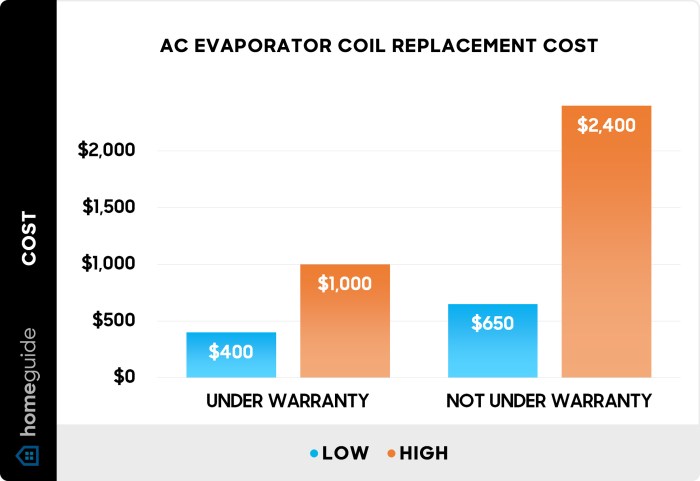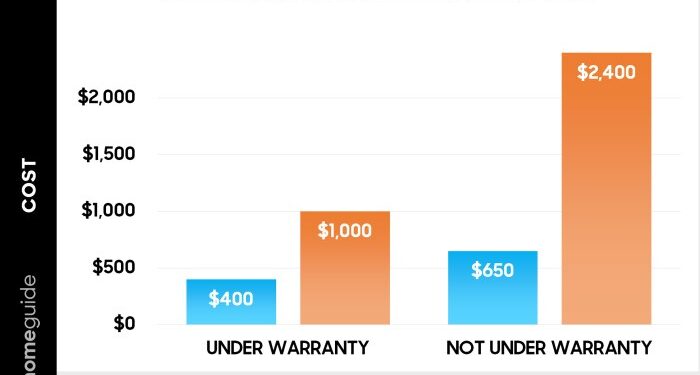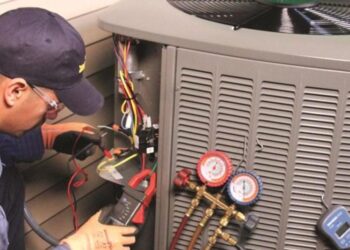Starting off with Air Conditioner Replacement Costs: What Impacts the Price?, this paragraph aims to draw in readers with an intriguing overview of the topic.
The second paragraph provides detailed information about the various factors influencing air conditioner replacement costs, types of units, installation considerations, and additional costs to consider.
Factors influencing air conditioner replacement costs
When it comes to replacing an air conditioner, there are several factors that can influence the overall cost. These factors can range from the size of the unit to the complexity of the installation process, as well as external factors like geographical location and local labor costs.
Unit Size
The size of the air conditioner unit plays a significant role in determining the replacement cost. Larger units typically cost more to replace due to the higher material and labor costs involved. Additionally, smaller units may be more affordable but might not provide sufficient cooling for larger spaces, leading to potential higher long-term costs.
Energy Efficiency
Energy-efficient air conditioners tend to have a higher upfront cost but can result in lower energy bills over time. When replacing an air conditioner, opting for a more energy-efficient model can impact the overall cost. These units may qualify for rebates or tax incentives, offsetting some of the initial costs.
Installation Complexity
The complexity of the installation process can also impact the replacement cost. Factors such as the location of the unit, existing ductwork, and any necessary modifications to the space can influence the overall price. Complex installations may require additional labor and materials, increasing the total cost of replacement.
Geographical Location and Local Labor Costs
Geographical location and local labor costs can vary significantly, affecting the overall replacement cost of an air conditioner. Areas with higher living costs or higher demand for HVAC services may have higher labor rates, leading to increased replacement costs. Additionally, certain regions may require specific permits or compliance with local regulations, adding to the overall expense.
Types of air conditioning units
When it comes to replacing your air conditioner, there are several types of units to choose from. Each type has its own set of advantages and disadvantages, as well as varying initial costs and long-term maintenance expenses.
Central air conditioning
Central air conditioning systems are designed to cool an entire house through a network of ducts that distribute the air. These systems are typically more expensive to install than other types, but they offer efficient cooling for large spaces. Regular maintenance of the ductwork is essential to keep the system running smoothly.
Ductless mini-split systems
Ductless mini-split systems consist of an outdoor compressor unit and one or more indoor air-handling units. They are ideal for cooling individual rooms or areas of the house and are often more energy-efficient than central air conditioning systems. While the initial cost may be higher, ductless systems are easier to install and require less maintenance.
Window units
Window air conditioners are a popular choice for cooling single rooms or small apartments. These units are affordable and easy to install, but they may not be as energy-efficient as central or ductless systems. Regular cleaning of the filters is necessary to ensure optimal performance.
Portable air conditioners
Portable air conditioners are versatile units that can be moved from room to room as needed. They are typically less expensive than other types of air conditioners and are easy to install. However, they may not be as powerful as central or ductless systems, and they require regular maintenance to keep them running efficiently.
Installation considerations
When replacing an air conditioner, the installation process is crucial in ensuring optimal performance and efficiency. Proper sizing, ductwork evaluation, and insulation requirements play a significant role in the overall cost and effectiveness of the new unit.
Proper sizing
One of the key factors to consider during installation is ensuring the new air conditioner is properly sized for your space. An oversized unit can lead to short cycling and increased energy consumption, while an undersized unit may struggle to cool the area efficiently.
Ductwork evaluation
Before installing a new air conditioner, it is essential to assess the condition of your existing ductwork
Insulation requirements
Proper insulation is essential for maintaining a comfortable indoor temperature and reducing energy costs. During the installation of a new air conditioner, it is important to ensure that your home is adequately insulated to prevent heat loss or gain. Upgrading insulation can enhance the overall performance of the HVAC system.
Finding a reputable HVAC contractor
When planning an air conditioner replacement project, it is crucial to hire a reputable HVAC contractor with experience in installation and maintenance. Look for licensed professionals who offer warranties on their work and prioritize customer satisfaction. Reading reviews and asking for referrals can help you find a trustworthy contractor for the job.
Additional costs to consider
When replacing an air conditioner, there are additional costs beyond the unit and installation to factor in. These costs can impact the total price of the replacement and should not be overlooked.
Permits and Regulations
- Obtaining permits for the installation of a new air conditioner can add to the overall cost. Depending on your location, there may be specific regulations or codes that need to be followed, requiring permits and inspections.
- Failure to comply with local regulations can result in fines or the need to redo the installation, leading to further expenses.
Disposal of Old Units
- Properly disposing of the old air conditioning unit is important and may come with additional fees. Some companies offer to take care of this for you, but it is essential to inquire about any associated costs.
- Improper disposal methods can harm the environment and may also result in fines, making it crucial to handle the old unit responsibly.
Potential Upgrades
- Consider potential upgrades like smart thermostats or energy-efficient features when replacing your air conditioner. While these upgrades can increase the initial cost, they can lead to long-term savings on energy bills.
- Smart thermostats offer convenience and energy savings by allowing you to control your home's temperature remotely and optimize cooling settings based on your schedule.
Regular Maintenance
- Regular maintenance of your new air conditioning unit is essential to ensure optimal performance and longevity. Neglecting maintenance can lead to breakdowns and unexpected repair costs in the future.
- Investing in a maintenance plan with your HVAC provider can help prevent costly repairs and prolong the lifespan of your air conditioner.
End of Discussion

Concluding this discussion on Air Conditioner Replacement Costs: What Impacts the Price?, the summary wraps up the key points discussed in an engaging manner.
Questions and Answers
What factors can impact air conditioner replacement costs?
Factors such as unit size, energy efficiency, installation complexity, geographical location, and local labor costs can influence the price.
What are the different types of air conditioning units available for replacement?
Central air conditioning, ductless mini-split systems, window units, and portable air conditioners are some common types to consider.
Why is proper sizing and insulation important during installation?
Proper sizing ensures efficient cooling, while adequate insulation helps maintain the desired temperature inside your home.
What additional costs should be considered for air conditioner replacement?
Permits, disposal of old units, potential upgrades like smart thermostats, and regular maintenance expenses are important factors to include in your budget.










![How To Avoid Contractor Scams [Infographic]](https://ac.radartasik.id/wp-content/uploads/2025/10/how-to-avoid-contractor-scams-feat-120x86.png)

